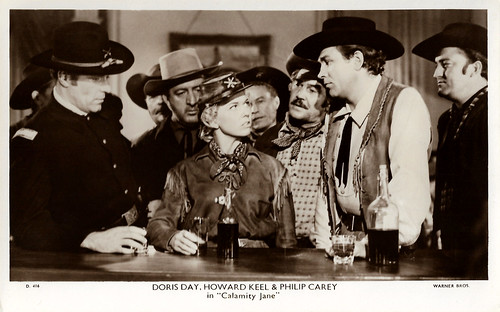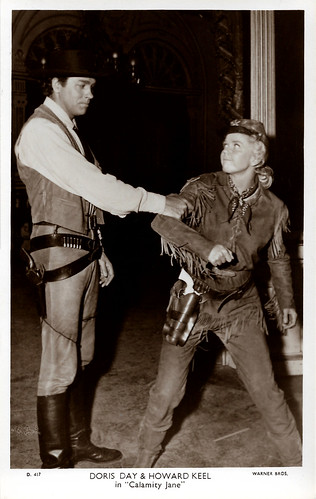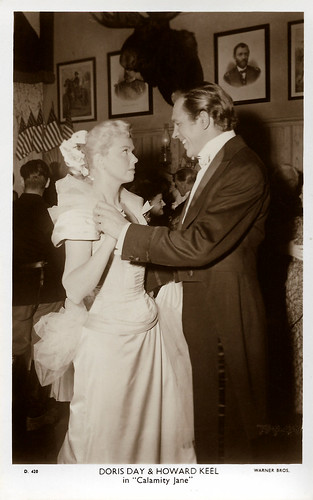
British postcard in the Greetings series. Photo: M.G.M.

Belgian postcard, no. 352. Howard Keel in Show Boat (George Sidney, 1951).

Italian postcard by B.F.F. Editore, no. 2682. Photo: M.G.M. (Metro Goldwyn Mayer).
MGM's answer to Gordon MacRae
Harold Clifford Keel was born in Gillespie, Illinois, in 1919. He was the younger of two sons born to Navyman-turned-coalminer Homer Keel and his wife, Grace Margaret (née Osterkamp). Howard's elder brother was Frederick William Keel. His childhood was unhappy. His father was a hard-drinking coal miner, and his mother a stern, repressed Methodist homemaker. When Keel was 11, his father died, and Keel and his mother moved to San Diego in California.
He graduated from Fallbrook High School at age 17. He then held a variety of jobs until he finally got permanent employment with the Douglas Aircraft Company. It was his landlady who pointed out to 20-year-old Keel that he had a good singing voice. On her advice, he took singing lessons to improve himself. In 1941, he played the role of Samuel the Prophet in 'Saul', an oratorio by Handel. He got more roles and started specialising in musicals. In 1945, he sang in 'Carousel' and 'Oklahoma!'
He performed for some time with 'Oklahoma!' with great success in England, where he also used his stage name ‘Howard Keel’ for the first time. Keel also made his film debut in England with the Film Noir The Small Voice (Fergus McDonell, 1948), starring Valerie Hobson. He played an escaped convict holding a playwright and his wife hostage in their English country cottage. The film received a BAFTA nomination for Best British Film in 1949.
After his successes in London, Keel returned to the US. Metro-Goldwyn-Mayer was looking for an answer to Warner Bros.' Gordon MacRae and contracted Howard Keel. The studio cast him as Frank Butler in the film version of Irving Berlin's Annie Get Your Gun (George Sidney, 1950), co-starring Betty Hutton. The film was a big hit, and
Howard Keel became one of MGM's major musical stars. The studio put him with Esther Williams in Pagan Love Song (Robert Alton, 1950), which was successful, but not as profitable as most Esther Williams films because it went over budget.

Vintage card. Photo: M.G.M. Howard Keel in Pagan Love Song (Robert Alton, 1950).

Spanish postcard by Archivo Bermejo, no. 4820. Photo: M.G.M. Howard Keel and Betty Hutton in Annie Get Your Gun (George Sidney, 1950). The Spanish title was La reina del oeste.

British postcard in the Picturegoer Series, London, no. D 421. Photo: Warner Bros. Doris Day and Howard Keel in Calamity Jane (David Butler, 1953).
Miss Ellie's second husband
Howard Keel had a third hit in a row with the comedy Three Guys Named Mike (Charles Walters, 1951), supporting Van Johnson and Jane Wyman. Even more popular was Show Boat (George Sidney, 1951), where Keel played the male lead with Kathryn Grayson and Ava Gardner. He played lead roles in Kiss Me Kate (George Sidney, 1953) with Kathryn Grayson, Seven Brides for Seven Brothers (Stanley Donen, 1954) starring Jane Powell, and Kismet (Vincente Minnelli, Stanley Donen, 1955) with Ann Blyth.
Other studios were also interested, and Keel was hired by Warner Bros. to play Wild Bill Hickok opposite Doris Day in Calamity Jane (David Butler, 1953). After his contract with MGM expired, Keel returned to his first love, the stage. In 1957, he was in a short-lived revival of 'Carousel'. With changing tastes of American audiences, there was less and less work for him. In Great Britain, he made the thriller Floods of Fear (Charles Crichton, 1959) with Anne Heywood. He returned to Hollywood to play Simon-Peter in the Biblical epic The Big Fisherman (Frank Borzage, 1960).
Howard Keel went to Europe to make the low-budget war drama Armored Command (Byron Haskin, 1961) with Tina Louise. In England, he starred in the Sci-Fi Horror film The Day of the Triffids (Steve Sekely, Freddie Francis, 1962). Back in the United States, Keel performed in nightclubs and acted in B-movies, mostly Westerns. The best known is The War Wagon (Burt Kennedy, 1967) with John Wayne and Kirk Douglas. It featured Keel as a wisecracking Indian. Howard Keel started drinking, which eventually cost him his second marriage.
In the early 1970s, he married Judy Magamoll, twenty-five years younger, who helped him fight his alcoholism. He even played another role in the musical 'Ambassador', but the production flopped. His health had been affected by the drink, though, and in 1986 he underwent double bypass surgery. Meanwhile, he had also become involved in the medium of television. After an appearance in an episode of the TV series The Love Boat, he was asked for the television series Dallas after the death of Jim Davis. In 1981, he got the role of oil baron Clayton Farlow, Miss Ellie's second husband, in the fourth season. Keel quickly became popular with the role and would stay on until Dallas disappeared from the screen in 1991. In later years, he continued to appear in concerts. As a result of this renewed fame on TV, Keel landed his first solo recording contract with 'And I Love You So' in 1983.
He returned to the screen as one of the hosts of the compilation film That's Entertainment! III (Bud Friedgen, Michael J. Sheridan, 1994), which was released by Metro-Goldwyn-Mayer to celebrate the studio's 70th anniversary. It was the third and final series of retrospectives that began with the first That's Entertainment! (1974) and That's Entertainment, Part II (1976). Howard Keel married three times. In 1943, he met and married actress Rosemary Cooper. They divorced in 1948. During the London run of 'Oklahoma!, Keel met Helen Anderson, a member of the show's chorus, and they married in January 1949. Keel and Helen divorced in 1970. Keel married airline flight attendant Judy Magamoll in 1970. In 1994, Keel and Magamoll moved to Palm Desert, California. There, Howard Keel died of colon cancer in 2004. Keel had four children: three with Helen Anderson (two daughters, Kaija Liane and Kirstine Elizabeth; and a son, Gunnar Louis) and one by his third wife, Judy Magamoll (a daughter, Leslie Grace), and 10 grandchildren.

British postcard in the Picturegoer Series, London, no. D. 416. Photo: Warner Bros. Philip Carey, Doris Day and Howard Keel in Calamity Jane (David Butler, 1953).

British postcard in the Picturegoer Series, London, no. D 417. Photo: Warner Bros. Doris Day and Howard Keel in Calamity Jane (David Butler, 1953).

British postcard in the Picturegoer Series, London, no. D 420. Photo: Warner Bros. Doris Day and Howard Keel in Calamity Jane (David Butler, 1953).
Sources: Gary Brumburgh (IMDb), Wikipedia (Dutch and English) and IMDb.
No comments:
Post a Comment